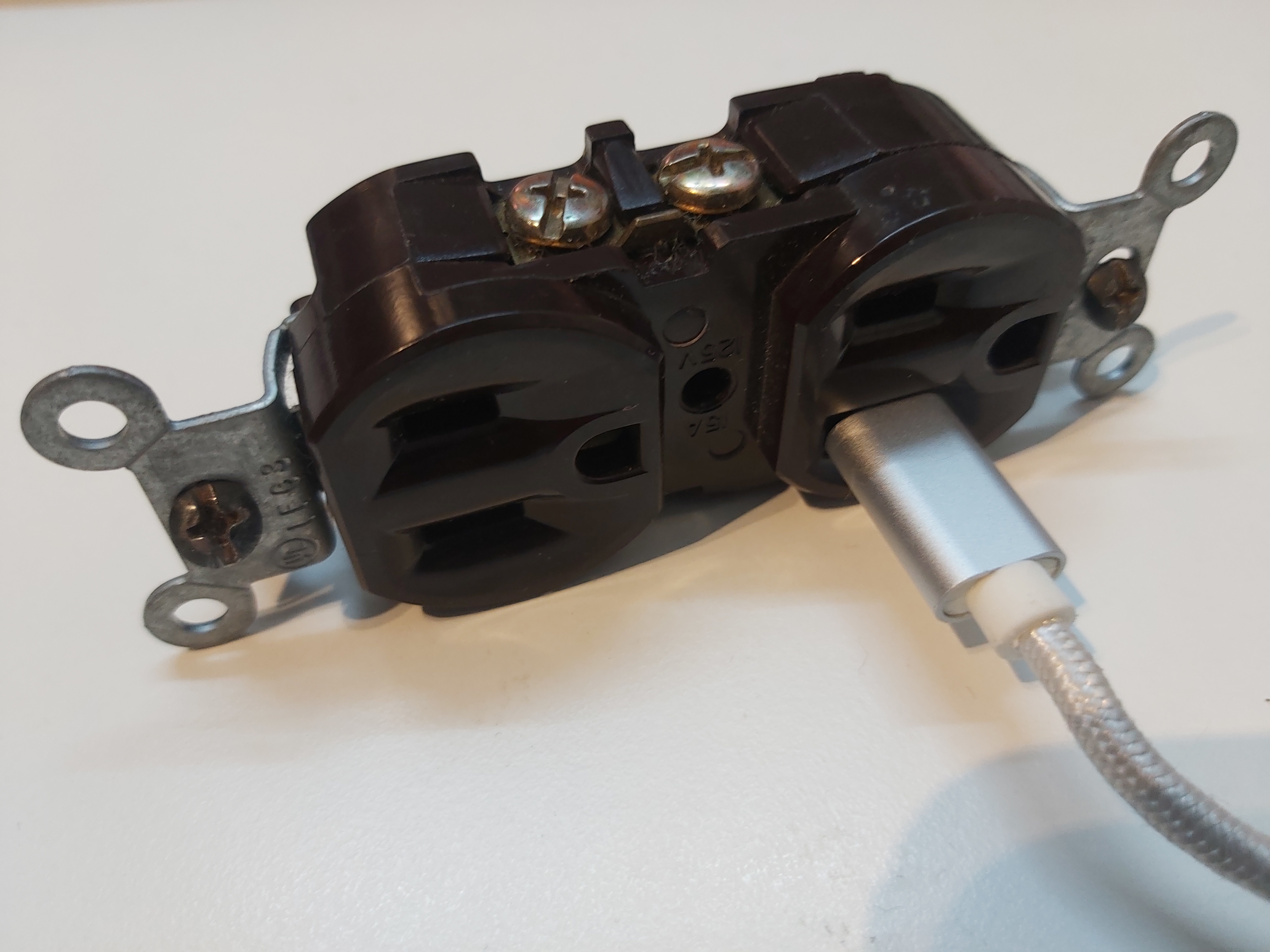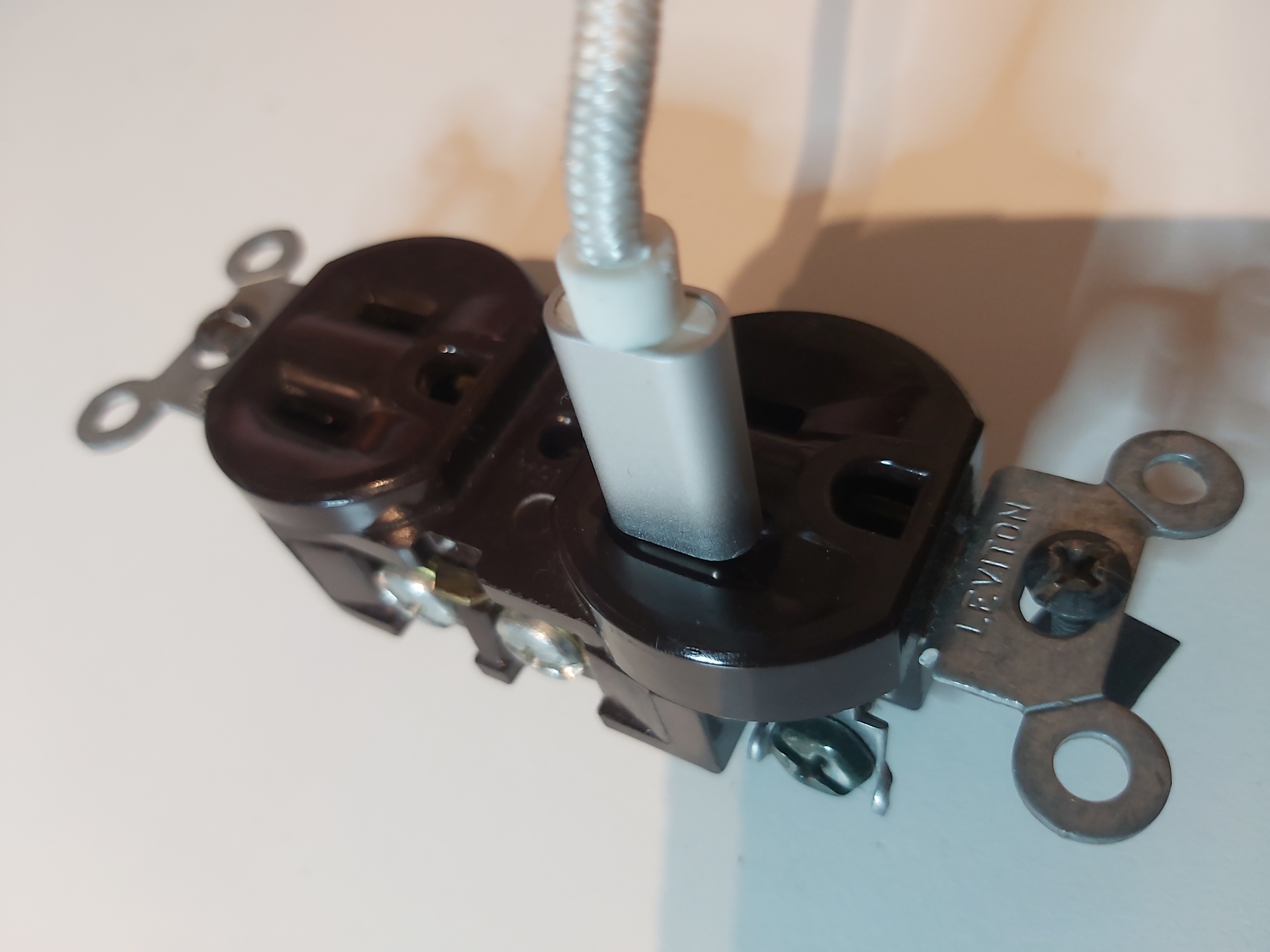Have you noticed that the size of the USB C plug is such that it is possible to insert it to an US outlet. The USB C connector just fits to the wider prong hole in the US connector (slightly too big for thinner prong hole).
It is even possible to make the USB connector to make contact with the metal parts inside the connector (depends somewhat on the USB C connector and outlet construction if it can make contact).
Fortunately the wider prong connects the neutral wires (wires carrying unused electricity back to the breaker panel), so it does not shock you badly if the outlet is correctly wired.
It is the narrow prong that connects the hot wires (wires carrying electricity from the panel to an outlet or a switch). And USB C cannot fit into this.


11 Comments
Tomi Engdahl says:
USB C is a proper AV connector I think. Is is a potential recipe for a disaster?
Have you noticed that the size of the USB C plug is such that it is possible to insert it to an US outlet. The USB C connector just fits to the wider prong hole in the US connector.
It is even possible for the USB connector to make contact with the current carrying metal parts inside the outlet!
Tomi Engdahl says:
Dual USB-C
https://xkcd.com/2493/
Tomi Engdahl says:
An early American electrical plug and socket was invented by Harvey Hubbell and patented in 1904. Hubbell’s first design was a socket which screwed into a lampholder (like the early lampholder plugs), but with a separable plug with pins (U.S. Patent 774,250) or blades (US patent 774251).
https://en.wikipedia.org/wiki/History_of_AC_power_plugs_and_sockets#:~:text=An%20early%20American%20electrical%20plug,blades%20(US%20patent%20774251).
On November 8, 1904, Harvey Hubbell II patented the first detachable electric plug in the United States. The Separable Attachment-Plug, US patent number 774,250, followed Hubbell’s electric switch design in 1891 and his patent for the pull-chain electrical light socket in 1896.
https://connecticuthistory.org/first-us-detachable-electric-plug-today-in-history-november-8/
Tomi Engdahl says:
Harvey Hubbell had patented the parallel blade plug in 1913
https://en.wikipedia.org/wiki/History_of_AC_power_plugs_and_sockets
Biodesign says:
The website here is an outstanding service that I use constantly. It helps me when I am overburdened and have no time to get all tasks in my agenda completed on time.
Tomi Engdahl says:
By the way microUSB could fit in to both neutral and live holes!
Tomi Engdahl says:
https://en.wikipedia.org/wiki/NEMA_connector
All NEMA 1 devices are two-wire non-grounding devices (hot-neutral) rated for 125 V maximum. 1-15P plugs have two parallel flat blades, 1⁄4 inch (6.4 mm) wide, 0.06 inches (1.5 mm) thick, 5⁄8–23⁄32 inch (15.9–18.3 mm) long, and spaced 1⁄2 inch (12.7 mm) apart.
In older plug designs both blades were the same width, so the plug could be inserted into the receptacle either way around. Many plugs manufactured since 1948 are polarized; the neutral blade is 5⁄16 in or 7.9 mm wide, 1⁄16 in or 1.6 mm wider than the line blade, so the plug can be inserted only one way. Polarized 1-15P plugs will not fit into unpolarized receptacles, which possess only narrow slots. Polarized 1-15P plugs will fit 5-15R grounded receptacles, which have the same wider slot for the neutral blade. Some devices that do not distinguish between neutral and line, such as internally isolated AC adapters, are still produced with unpolarized narrow blades
Tomi Engdahl says:
Expect for plug-in mistakes to happen with outlets like this:
Leviton’s dual USB-C wall outlet now available, great for fast-charging iPhone, iPad, more
https://9to5toys.com/2019/04/26/leviton-usb-c-wall-outlet/
After announcing its latest USB-C in-wall outlet back in February, Leviton’s dual USB-C outlet is now available for purchase. The outlet features two standard receptacles as well as dual USB-C ports that can offer up to 30W of fast-charging power each, making it a slick solution for iPhone, iPad, MacBook, and more.
Tomi Engdahl says:
I see some potential dangers with this kind of products
https://m.made-in-china.com/product/Us-Standard-Fast-Charging-Pd3-0-Type-a-and-Type-C-USB-Outlet-774329112.html
Tomi Engdahl says:
What happens when you try to plug your phone charger without looking at the outlet
https://m.youtube.com/watch?v=IasDJuSUhX0&feature=youtu.be
Tomi Engdahl says:
Check this out
https://xkcd.com/2493/